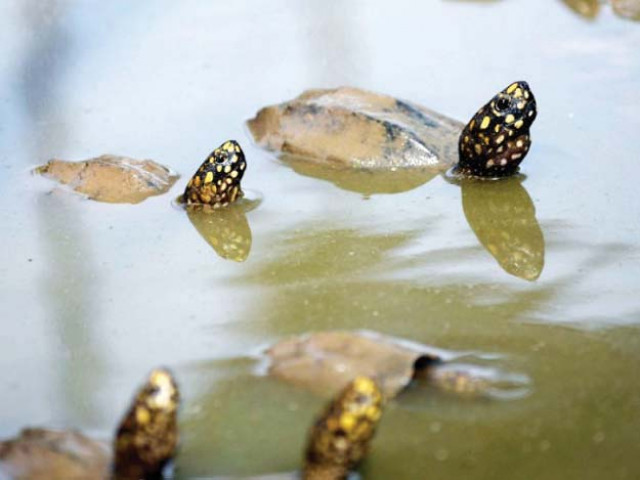Shells in trouble: Meat of over 4,000 turtles seized from Karachi port
The consignment comprised meat, bones and skulls of 4,342 turtles.

A consignment containing the meat of as many as 4,342 protected freshwater turtles was seized by the Customs officials in the last week of February. PHOTO: FILE
Pakistan Customs officials claim to have seized a consignment comprising meat of over 4,000 freshwater turtles that was being smuggled from the Karachi port. Officials claim it is the largest consignment of its kind in the history of the country.
The consignment containing meat of the protected freshwater species was seized in the last week of February. The meat was being transported in a container, marked as dried fish maw and skin.
"We suspected that the consignment contained turtle meat, bones and skulls," said the additional collector of Customs, Irfan Javed. "It was an illegal consignment and an international chain was involved in the smuggling bid."

The Customs officials claimed the consignment contained meat of 4,342 turtles, adding that the total weight was about 1,900 kg. "The meat of a single turtle is worth over Rs150,000," said Javed. "I am certain this was the biggest illegal consignment of turtle meat in the world and, unfortunately, it happened in our country," said another Customs official.
Officials of the wildlife department believe that several influential people were involved in the smuggling bid. Customs officials claimed that some suspects have been detained and an FIR according to the Customs and Sindh Wildlife laws has been registered. "Strict action will be taken against people involved in the illegal trade," assured Javed.
A protected species?
The freshwater turtle is a protected species. Their smuggling and illegal trade has, however, only increased over the years. Traffickers have previously exploited lax laws as only a fine of Rs50,000 was imposed on an entire consignment in the past. Recently, the Sindh Wildlife Department issued a notification, declaring that a Rs50,000 fine will be imposed for each turtle caught during trafficking.
The turtles are called scavengers of water and their presence ensures the purity of potable water. "They [smugglers] are polluting our water and destroying nature," remarked another official.
Javed Ahmed Maher, the conservator of the Sindh Wildlife Department, said: "Animal trafficking is an international issue and it is easier to smuggle such species compared to heroin." He added that these turtles are found across the Indus river, from Attock to the Indus Delta. The process of drying turtle meat takes at least six months.
These turtle species are native to the Indus river and listed in the Convention on International Trade in Endangered Species of Wild Fauna and Flora (CITES). Their poaching, catching, trapping, netting and suing as part, whole or derivatives, trading, transport and export is strictly prohibited as per the Sindh Wildlife Protection Ordinance, 1972.
Despite strict rules, the business is on the rise due to the weak capacity of the wildlife department and lack of resources. "Yes, we are under-resourced," admitted Maher.
There are eight kinds of freshwater turtles in Sindh and according to official sources, a majority of the protected species have been smuggled in the last 15 years. There was a time when turtles were commonly found on the banks of canals but they are fast disappearing due to the general apathy of the government.
Earlier, Customs officials had seized around 200 black-pond turtles from Jinnah International Airport, Karachi, on September 20 last year. They were released in the waters on court orders. The case against the smuggler, Sajid Cheema, is pending in the Sindh High Court – the next hearing is on March 12.
Last year, over 200 turtles smuggled into China finally found their way back home to Pakistan, thanks to the collaborative efforts of Chinese authorities as well as the Gilgit-Baltistan and Sindh wildlife departments.
The consignment was seized in the neighbouring country during the last week of June 2014 after authorities received information on 'unusual luggage' coming from Pakistan. When intercepted, the authorities found the consignment contained 220 hard-shell turtles.
Published in The Express Tribune, March 6th, 2015.


















COMMENTS
Comments are moderated and generally will be posted if they are on-topic and not abusive.
For more information, please see our Comments FAQ